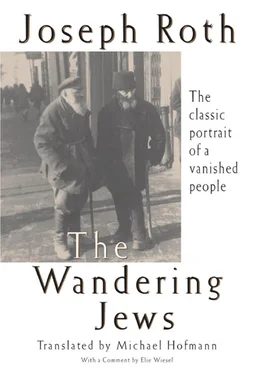At sea, though, he doesn’t know where God lives. He can’t tell where Misrach is. He doesn’t know his where-abouts in the world. He isn’t free — where he is depends on the course of the ship. Anyone like the Eastern Jew, who, deep within his blood has the knowledge that he might have to flee at any moment, cannot possibly feel at ease on a ship. Where can he run to, if something happens? He’s been on the run for thousands of years. For thousands of years menacing things have been happening to him and around him. He has been fleeing for thousands of years. What is he afraid of? Who can tell? Might there not be a pogrom on a ship? Then what?
If a passenger happens to die on board ship, where do they bury the dead man? The corpse is lowered into the water. The old legend of the coming of the Messiah gives a detailed description of the resurrection of the dead. All Jews who are buried in foreign soil will have to roll underground until they reach Palestine. Fortunate are those who are buried there: They are spared the long and laborious journey, the ceaseless rolling for mile upon mile. But will the dead awaken if they have been submerged in the water? Is there land under the water? What strange creatures live down there? A Jew’s body may not be cut into pieces. It must be returned to dust whole and unimpaired. But don’t sharks devour bodies committed to the water?
In any case the promised steamer ticket hasn’t arrived. Of course it’s on its way. But it’s not sufficient on its own. An entry permit is needed too, and you don’t get that without papers. Where are the papers?
And now begins the last, the ultimate, battle for papers, against papers. If the struggle is successful, nothing more is needed. Once in America everyone is automatically issued with a new name and new papers.
Don’t be surprised at the Jews’ lack of attachment to their names. They will change their names with alacrity, and the names of their fathers, even though those particular sounds, to the European sensibility, are charged with emotional weight.
For Jews their names have no value because they are not their names. Jews, Eastern Jews, have no names. They have compulsory aliases. Their true name is the one by which they are summoned to the Torah on the Sabbath and on holy days: their Jewish first name, and the Jewish first name of their father. Their family names, however, from Goldenberg to Hescheles, are pseudonyms foisted upon them. Governments have commanded Jews to have names. Does that make the names their own? If a man’s name is Nachman, and he changes it to the European Norbert, what else is Norbert but camouflage? Is it anything more than a falsification? Does the chameleon feel any respect for the colors he continually keeps changing? In America, the Jew changes Grünbaum to Greenboom. The shift in the vowels doesn’t upset him.
3.
Unfortunately, though, he is still not in a position to call himself what he likes. He is still in Poland or in Lithuania. He still needs papers to confirm his birth, his existence, his identity.
And he begins to walk the paths that, in their small, microcosmic way, are just as tangled, as unpredictable, as ridiculous, and as tragic as those his fathers walked before him. He doesn’t get sent from Pontius to Pilate,* but more like from the anteroom of Pontius to the locked door of Pilate. All official doors are barred to him. It takes a petty bureaucrat to unlock them. But if anyone takes sadistic pleasure in turning people away, then it’s petty bureaucrats.
Can they be bribed? As if that were straightforward! Can you be sure that an attempt at bribery wouldn’t involve you in some huge court case where you wind up in prison? The only thing that may be said with confidence is that all officials are corruptible. Yes, everyone is corruptible. Corruptibility is a prime human virtue. But if and when someone will admit his corruptibility remains a great imponderable. It is not impossible that an official, having taken money on ten previous occasions, will bring charges against you on the eleventh, to prove his innocence on those ten occasions and to allow him another hundred with impunity.
Luckily there are people almost everywhere with precise insight into the official’s soul. They live from their knowledge. Moreover these experts are Jews. But because they are so rarely met with in every town, and because they have the ability to drink with the officials in the local language, these Jews are practically officials themselves, and you need to bribe them before you can even think of the actual bribing.
But even a successfully completed bribe saves you no humiliation and no wasted journeys. You suffer the humiliations and you embark on the wasted journeys.
And then you have your papers.
4.
And then when everything has been done, America shuts down its borders again, says it’s had enough Eastern Jews for another year, and so you sit down and you wait till next year.
Then at last you travel by fourth-class rail to Hamburg. It takes six days. You spend another two weeks waiting for the ship. Finally you embark. And while all the other passengers are waving their handkerchiefs, close to tears, the Jewish emigrant for the first time in his life rejoices. He is afraid, but he trusts in his God. He is on his way to a country that greets all new arrivals with a gigantic statue of liberty. The reality must somehow correspond to this enormous monument.
To some extent, the reality does correspond to the symbol. Not because they really are all that serious about liberty in the new country, but because they have people who are more Jewish than the Jews, which is to say the Negroes. Of course Jews are still Jews. But here, significantly, they are first and foremost whites. For the first time a Jew’s race is actually to his advantage.
The Eastern Jew travels third class or in steerage. The crossing is easier than he imagined, but getting ashore is much harder.
The medical examination in the European port was bad enough. Now there is a still-more-rigorous one. And something turns out to be not quite right with your papers.
The papers are genuine, and very hard to obtain too, but they still look somehow not quite right.
Possible too that some vermin has got into the Jew’s shirt during the crossing.
Everything is possible.
And so the Jew winds up in a kind of prison that goes by the name of “quarantine,” or somesuch.
A high fence protects America from him.
Through the bars of his prison, he sees the Statue of Liberty, and he doesn’t know whether it’s himself or Liberty that has been incarcerated.
He thinks about what New York will be like. He can hardly imagine it.
It will be this way: He will live among twelve-story buildings, surrounded by Chinese, Hungarians, and other Jews. Once more he will be a peddler, once more fear the police, once more be bullied.
His children will perhaps become Americans. Perhaps rich and famous Americans. Kings of some mineral or manufactured substance.
These are the dreams of the Jew, behind bars in his quarantine.
*The equivalent, and possibly the origin, of the English expression “from pillar to post.”
T HE C ONDITION OF THE J EWS IN S OVIET R USSIA

The Jews were a recognized “national minority” in czarist Russia, but they were persecuted. Contempt, oppression, and pogroms confirmed the status of the Jews. There were no efforts to assimilate them by, say, programmatic rapes. The effort was to exclude them. The means employed looked more like an attempt to eradicate them.
Читать дальше













